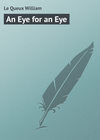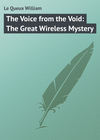Loe raamatut: «An Eye for an Eye», lehekülg 12
“I quite understand,” he said gravely, speaking for the first time. “That’s only natural. But the difficulties in our way appear almost insurmountable.”
“Well?” I asked anxiously, “what is your opinion, now that I have told you everything?”
He shook his head, puffed thoughtfully at the fresh cigarette he had just lit, and then contemplated it thoughtfully.
“I have no opinion at present,” he responded. “One might form half a dozen theories upon these facts, all equally wide of the mark.”
“Then how are we to act?” I asked in dismay.
He raised his dark eyebrow’s in gesture of bewilderment. Then he gazed gravely in my face.
“Look here, Boyd,” I continued, “I love Eva Glaslyn, and to you I make no secret of it whatsoever. But at all hazards I mean to ascertain the truth.”
“Even at the risk of convicting her?” he inquired, looking across at me quickly.
“Convicting her!” I echoed. “Then you really entertain the same suspicion as myself?”
“We may have suspicions without forming any theories,” he responded calmly. Then he added, in a tone of regret, “It’s certainly a thousand pities that you love her.”
“Why?”
“Upon your own showing she appears to have very little regard for you.”
“How?”
“Well,” he answered slowly, “there’s no doubt that the other day an attempt was made upon your life.”
“And you suspect her?”
“We can suspect no one else,” he answered.
“According to that old herbalist’s statement she had purchased a certain drug of him. What could an innocent young lady require with this unnamed drug if not to administer it to some one she wanted to get rid of?”
“But she has no object in ridding herself of me,” I urged.
“Of that I’m not quite so sure, my dear fellow,” he observed, after a brief pause. “Recollect that on the morning when she went to St. James’s Park in order to meet, for some mysterious purpose, the man whom we now know was old Mr Blain, she met you face to face. We have no idea what her actions were previously, but she may have believed that you had been spying upon her; therefore, on recognising you when you were formally introduced at Riverdene, she conceived a plan for getting you out of the way. It was with that object very possibly that she made the secret purchase at the herbalist’s.”
“No, Boyd, I can’t believe it of her,” I said quickly. “I won’t believe it!”
“Very well,” he said in the same calm tone as before. “But there’s still another fact extremely puzzling, and that is why this man Lowry should have left in such a hurry. I must inquire at the Carter Street Police-Station, the district wherein he lived, and see whether there was anything against him. By the way,” he added, “does your friend Cleugh know the whole of these facts you’ve explained to me?”
“No, not the whole – only some.”
“Does he know that you’ve declared your love to Lady Glaslyn’s daughter and been refused?”
“No.”
“Then don’t tell him,” said the detective.
“I believe that the reason of his sudden weariness of Lily Lowry’s society is due to the fact that he loves Mary Blain.”
“All the more reason, then, why he should in future remain in entire ignorance of whatever facts we may elicit.”
Then he paused, furiously consuming his cigarette and taking a long draught of the whisky-and-soda I had mixed and placed at his elbow.
“This is really a most remarkable mystery, Urwin,” he exclaimed at length, twisting the plain gold ring upon his finger, a habit of his when pondering deeply. “There seem a thousand complications. It’s absolutely the most astounding case that I’ve ever had in hand. Even Shaw, our superintendent at the Yard, a man whose deep-rooted conviction is that we never need fail if we really take an interest in an inquiry, acknowledged to me the other day that he could see no way to a clue. Of course, we might question Mrs Blain, or even arrest Blain himself on suspicion if we could find him again. But whoever is guilty has taken such careful precautions to obliterate every trace of a clue that both the superintendent and myself are agreed that the interrogation of either of the Blains would only result in defeating our ends.” That was exactly my own opinion. I had many times wondered why the police had not made inquiries of Mrs Blain on account of the statement by the landlord at Kensington, but it was now plain that the Director of Criminal Investigations, the greyheaded, loud-voiced, old gentleman whom I knew quite well at Scotland Yard, had decided otherwise.
“But why are you so anxious that my friend Cleugh should remain in ignorance of our movements?” I inquired.
“You say that he loves Mary Blain,” answered Boyd. “He might in that case drop some unintentional hint to her of the direction of our inquiries. This matter, to be successful, must be entirely a secret between ourselves – you understand? To-day we’ve made a discovery – the identity of the man who threw some object into the lake – and it puts a rather fresh complexion upon the affair, even though it further complicates it considerably. You said that his wife has all along told you that her husband was in Paris – I think?”
“Yes,” I responded. “She said he was there in connexion with some company which he was trying to promote.”
“And all along he has been in London – in hiding.”
“He may have just returned from Paris,” I suggested. “Recollect that I’ve not been to Riverdene for some little time.”
“No, my dear fellow,” Boyd said. “His ingenuity in eluding us in Ebury Street showed that he had already prepared a snug hiding-place for himself before that tragedy at Phillimore Place. Besides, the other evening his clothes showed an attempt at disguise – didn’t they?”
“Certainly. He’s very smartly dressed always; indeed, rather a fop in his way.”
“Depend upon it that he’s never dared to set foot outside London all this time. He knows well enough that the Metropolis is the safest place in the whole world in which a criminal may conceal himself. Only a bungler attempts to get away abroad.”
Silence again fell between us. The quiet was unbroken save for the slow ticking of the clock upon the mantelshelf. Of a sudden, with a rather curious glance, he bent forward to me, eagerly saying —
“Now in this affair we must be perfectly candid with each other. You must conceal nothing from me.”
“I have concealed nothing,” I protested, surprised at his curious attitude, as though he held me in some suspicion.
“I don’t allege that you have,” he answered. “But I want you to answer truthfully a question which is of highest importance. I want you to tell me whether, on the afternoon of the day you were called by Patterson to Kensington, your friend Cleugh was here, at home.”
“No, he certainly wasn’t. I arrived home first, and he came in perhaps ten minutes or a quarter of an hour later than usual,” I answered, wondering what connexion this could have with the inquiry.
“And after you made the discovery you did not telegraph or communicate with him in any way? I take it that you were surprised to meet him in that house.”
“Certainly I was,” I responded. “But he had an appointment with Lily Lowry, and finding that she could not keep it, he came along to Kensington to ascertain the nature of the event about which Patterson had wired to me.”
The detective’s features relaxed into a strange smile.
“Would you be surprised then to know that your friend never called at the Police-Station on that evening, but went straight to Phillimore Place and there joined me while you were absent inquiring of the neighbours? That very evening I inquired of the constable on duty at the door of the station, and of others, all of whom told me that no one had called to inquire for Patterson except yourself.”
“That’s certainly extraordinary,” I said in wonderment.
“Yes,” he observed mechanically. “It’s a very curious fact; one which appears to prove that he knew something more of the mysterious occurrence than he has admitted – in fact, that he was aware of it long before we were.”
“What!” I gasped, gazing at my companion in alarm. “Surely you don’t mean that you suspect Dick of having had any hand in the affair?”
Then, at that instant, I recollected how, when I had received the telegram on that memorable evening, his face had suddenly changed, and his hand had trembled.
Chapter Eighteen
“You will never Know – Never!”
Dick returned about eleven, and shortly afterwards Boyd swallowed another whisky-and-soda and left.
I thought my friend started slightly at finding the detective with me, but he betrayed not the slightest annoyance. Indeed, he himself started the discussion regarding the mystery, appearing in no way loth to discuss it in all its phases.
The detective’s suspicion was certainly a startling one, and of course accounted for his anxiety that Dick should in future remain in utter ignorance of our actions. When Boyd had gone he at once commenced to question me upon what theories he had expressed, and in what direction he was prosecuting inquiries. Although I would not allow myself to suspect my best friend, I nevertheless preserved the silence which Boyd had imposed upon me, evading giving him direct answers, preserving the secret of the identity of the man seen in St. James’s Park, and managing to put aside his questions by a declaration that personally I was sick of the whole matter, for I felt that it would now ever remain a mystery.
That night, however, I remained awake many hours thinking fondly of Eva, and calmly revolving in my mind all that had fallen from the lips of Boyd. He, one of the most skilful officers in London, had formed no theory. He only entertained certain suspicions, vague perhaps, yet by no means groundless. I had not seen Eva since that day when the strange, incomprehensible attempt had been made to take my life, and a strong desire again possessed me to stroll at her side, to hear her voice, to hold her hand. Was it, I wondered time after time, that hand, so soft, slim and delicate, that had actually attempted to secretly take my life?
The detective had calmly reviewed all the facts I had explained, and, as a professional investigator of crime, had openly expressed a suspicion in the affirmative.
Often had I wondered what kind of woman was Eva’s mother, whom I had never met. That she was somewhat eccentric was evident from her daughter’s words on the last occasion I had visited Riverdene. I lay there thinking of Eva, scouting every suspicion which the detective’s words had aroused within me, until with the first streak of dawn I fell asleep and dreamed of her.
Next afternoon, without mentioning anything to Dick save the sending of a telegram to say I should not dine at home, I left my office half an hour earlier, and full of conflicting thoughts travelled down to Riverdene.
Having been informed by the servant that Mrs Blain and Miss Mary were absent in London shopping, but that Miss Glaslyn was at home, I was shown into the long, pleasant drawing-room which opened upon the wide lawn sloping to the river’s brink. The great bowls of cut flowers diffused a pleasant odour, and the books and papers lying in the cosy-corner, with its soft cushions of pale-blue silk, betrayed signs of recent occupation.
It was a low-ceilinged, comfortable apartment, cool and restful after the dust and glare of the white road outside.
In a few moments the door opened and Eva entered, fresh and charming in a cool dress of cream flannel, her sweet face illumined by a smile of glad welcome.
“This is quite an unexpected pleasure, Mr Urwin!” she exclaimed, rushing towards me gladly with outstretched hand. “I had no idea that you’d come down to-day. The Blains are up in town, you know. I should have gone, only I had a rather bad headache. We went up to Windsor yesterday with the Thurleys on their launch, and I suppose the sun upset me. It was unbearably hot.”
“Why do you persist in calling me Mr Urwin?” I asked in a rather reproachful tone, still retaining possession of her hand. “Cannot you call me Frank?”
She blushed slightly, and drew her hand forcibly away. Then motioning me to a seat she cast herself into a low armchair near me, stretching forth her tiny foot, neat in its silk stocking and patent leather shoe. She made no response to my suggestion, so I repeated it.
“Why should I call you by your Christian name?” she asked.
“Because I call you by yours, Eva,” I answered earnestly. “I really can’t bear this persistent formality.”
She smiled, a rather curious smile it was, I thought.
“So you’re staying as guest here?” I went on, after a moment’s pause.
“Yes,” she explained. “My Uncle Henry, in Inverness, is very ill and not expected to live; therefore they summoned mother by telegraph, with other members of the family. As the servants have had no holiday this year, she sent them away for a fortnight and closed the house, Mrs Blain having invited me here.”
“Have you heard from your mother?”
“Yes, I had a wire yesterday to say that she had arrived, safely,” she answered, not, however, without a second’s hesitation, as though she were debating whether or no to tell me the truth.
“And Mr Blain has not returned from Paris yet?” I asked.
“No,” she responded. “The Blains are talking of joining him next week, or perhaps the week after, and have invited me to accompany them. I should be delighted, for I love Paris.”
“You find the shops interesting?” I laughed.
“Yes,” she answered. “All women do, I suppose. At least I’ve met very few who, having been in Paris, haven’t hunted for bargains at the Louvre, the Printemps, or the Bon Marché. Paris is worth visiting if only for one’s hats, for you can often buy a hat for twenty francs exactly the same style and of better material than that for which you pay three or four guineas in Regent Street.”
“I’m not much of an expert in such things,” I laughed, nevertheless recollecting how curious it was that Blain remained still in London. Might not his wife and daughter have gone up that day to visit him in his hiding-place?
“But you’ve been awfully queer, I hear,” she said concernedly. “You really don’t look quite yourself even now. What has been the matter? We were all so concerned when we heard about it.”
Our eyes met. In hers there was a deep, earnest look as though she were really solicitous of my welfare, yet I fancied somehow that those clear blue eyes wavered beneath my steady, searching glance. She watched me, reading me as easily as she would have read black letters on a white page.
“I was taken suddenly ill – the heat perhaps,” I answered with affected carelessness. “I had run down, the doctor said. It was nothing very serious.” She gave vent to a perceptible sigh of relief, then smiling sweetly as she ever did, said: “Well, it is indeed a pleasure to welcome you here again to-day.” She still wore that brooch, the quaint little playing-card which had betrayed her visit to Morris Lowry. Its sight sent a strange thrill through me, for I remembered the object of her visit to that dark, dirty, obscure herbalist’s.
“The pleasure is mutual, believe me, Eva,” I answered, putting away from me instantly the gruesome thought oppressing me. “Through this whole month I have thought only of you.”
She sighed, in an instant serious. Then glancing back to assure herself that there were no eavesdroppers, she said, “It would be far better, Mr Urwin – Frank – if you could leave me and forget.”
“But I can’t,” I said, rising quickly and again taking her soft white hand. “You know, Eva, how deeply, how sincerely, how devotedly I love you; how I am entirely yours for ever.”
I spoke simply and directly what I felt; I was calmer than I had been when I rowed her beneath the willows’ shade.
“Ah, no!” she cried in a pained voice, rising to her feet with sudden resolution. “You really must not say this. I will not let you sacrifice yourself. I will not allow you to thus – ”
“It is no sacrifice,” I protested, quickly interrupting. “I love you, Eva, with all my soul. One woman alone in all the world holds me beneath the spell of her grace, her charm and her sweetness. It is yourself. Every hour I think only of you; ever before me your face rises in my day-dreams, and in those moments when I see your sweet smiles I tell myself that no other woman can ever have a place in my heart. Ah! you cannot know how fondly I love you,” I said, raising the hand tenderly to my lips and imprinting a kiss upon it. “If you could only know you would never treat me with this cold, calm indifference.”
Her bosom rose and fell slowly, and she was silent. I fancied that she shuddered slightly.
At that moment my position struck me as an extremely strange one, declaring love to one whom an expert detective suspected of having made a cowardly attempt upon my life. Was it just? I asked myself. Yes, in this I was justified, for I loved her, even though I had more than once been inclined to agree with Boyd in his misgivings.
“I was not aware of any indifference,” she faltered at last, raising her great eyes, so clear and earnest, for an instant to mine. “I had merely urged you to reflect.”
“Reflection is unnecessary,” I answered quickly. “I know that I love you truly. That surely is sufficient.”
“It might be if I were free,” she responded in a low, hoarse voice. “But I tell you to-day, Frank, as I told you before, this love dream of ours is impossible of realisation.”
“Then you do reciprocate my love?” I cried, in joyous eagerness. “Come, tell me. Do not keep me longer in suspense.”
“I have already told you,” she answered in a low, intense voice. “Of what use is it to continue this painful discussion?”
“Of every use,” I cried in desperation. “Give me one word of hope, Eva. Tell me that some day you will try and love me better than you do now; that some day in the future you will become my wife. Tell me – ”
“No! no!” she cried, snatching her hand away and receding from me. “No, Frank, I cannot – I will not lie to you.”
“Then can you never love me – never?” I cried despairingly.
“Never,” she answered hoarsely, and her answer struck deep into my heart. “I have sinned – sinned before God and before man – and love no longer knows a place in my heart,” and her fine head was bowed before me.
“Sinned!” I gasped. “What do you mean?”
“I am as a social leper,” she panted, raising her head and looking at me with wild, unnatural gaze. “If you knew the dark and awful truth you would shun me rather than kiss my hand. Yet you say you love me – you! who would have so great a cause to hate me if you knew the ghastly truth!”
“But,” I cried, wondering at these strange words, and with my suspicions again aroused, “I do love you, nevertheless, Eva. I shall always love you, I swear it, for my very life is yours.”
“Your life!” she echoed in a weird, harsh voice, as she stood, pale-faced, swaying before me, her hands clasped to her breast, her lips cold and white. “Yes,” she said, in a strange, half-hysterical tone. “Yes, it is true, too true, alas! that your future is in my hands. Only by a miracle have you come back to life, a grim shadow of a crime to taunt, to defy, to denounce. Ah! Frank, you do not know the terrible truth; you will never know – never!”
I was bewildered. Horror possessed me. The darkness of an irreversible fact spread over her and made her terrible to me. All must be given up. Conscience pronounced this dread decree and multiplied the pain a thousand times.
Destiny had once more taken me by the elbow.
Chapter Nineteen
Eva Makes a Confession
“Why may I not know the truth?” I asked the blanched and agitated woman before me. Her involuntary declaration that I had only returned to life by little short of a miracle was in itself clear proof that she was aware of the attempt made to assassinate me. I therefore determined to question her further and ascertain whether Boyd’s grave suspicion had any absolute foundation. “You know, Eva,” I went on, standing before her with my hand upon her shoulder in deep earnestness, “you know how strong is my affection; you know that you are all the world to me.”
Often during my many visits to that riverside house, so cool and peaceful after the busy turmoil in which fate compelled me to earn my bread, I had spoken of my love for her, and now in my desperation I told her that I could not leave the woman whom I had so long worshipped in the ideal, whom I had instantly recognised as being the embodiment of that ideal, of whose presence I could not endure to be deprived even in thought.
She stood silent, with her back to the table, looking into my eyes while I told her these things. A ray of sunlight tipped her auburn hair with gold. Sometimes she would seem to yield to a kind of bliss as she listened to my avowal; to forget all else than ourselves and my words. At others a look of anguish would suddenly cloud her features, and once she shuddered, pressing her hands to her eyes, saying —
“Frank, you must not! Spare me this. I cannot bear it! Indeed I can’t.”
Sometimes, in the days that had passed, when I had spoken of my love, joy and pain would succeed each other on her face; indeed, often they would be present at the same moment. From the look of complete abandonment to happiness that sometimes, though never for long, shone on her features when we had idled up that shady, picturesque backwater, where the kingfishers nested, I felt that she loved me, and that eventually that love would gain the victory. Thus, continually, I tried to elicit an expression of her feelings in words. Sweet to me as was the confession of her looks, I sought also a confession of speech.
Alas! however, she seemed determined to give me no single word of encouragement.
“But why,” I asked, as she stood there with bent head, her hand toying nervously with her rings, “why is it that when I speak of what most occupies my heart you become silent or sorrowful?”
She smiled, a strange, artificial smile, and for an instant her clear blue eyes – those eyes which spoke of an absolute purity of soul – met mine, as she replied —
“Can a woman explain her caprice any more than a man can understand it?”
Without heeding this evasion I went on —
“Is it that you are already pledged to marry some other man?”
“No,” she answered, quickly and earnestly.
“Then it is because you do not wish me to love you,” I observed reproachfully.
Her look startled me, for it contained besides a world of grief and pity, something of self-reproach. She regarded me strangely, first as if my words were a welcome truth, then, while her brow darkened, a mental anguish forced itself into her expression.
“You were mad to come here to me,” she said, with a quick, apprehensive look. “If you knew the truth you would never again cross the threshold of this house.”
“Why?” I demanded, in an instant alert.
“For a reason that is secret,” she responded with a shade of sadness.
That ring of earnestness in her voice it seemed impossible to counterfeit. Puzzled, I gazed at her, striving to read her countenance. Her head was bent, her colour changing; do what she would she could not keep the blood quite steady in her cheek.
“But may I not know, Eva?” I implored. “Surely you will not refuse to warn or guide one who is so entirely devoted to you as I am?”
“I cannot warn you, except to say that treachery may be sweetly concealed, and danger lurk where you may least suspect its presence.”
“You wish to place a gulf between us,” I cried impatiently. “But that’s impossible. I cannot rest without you; I am drawn to you as though by some power of magic. I am yours in life, in death.”
“Ah, no!” she cried suddenly, putting up her hands to her face. “Speak not of death. You are making vows that must ere long be broken,” and she sighed deeply.
Was not her attitude, standing there pale and trembling, the attitude of a guilty woman who feared the revelation of her crime? I looked again at her, and becoming convinced that it was, I regarded her with inexpressible scorn and love, horror and adoration. She seemed to have changed of late. She pondered over my words, weighing them without any idle misleadings of fancy. Did she never dream as she had done when we first met?
“Why must my vows be broken when my love for you is so fervent, Eva?” I demanded, in a voice a trifle hard, I think.
She shuddered and gave a gesture of despair as if there were, indeed, no defence for her. A great darkness was over my mind like the plague of an unending night.
“I have warned you,” she responded, in a strange low tone. “If you really love me as you say you do, remain away from this house.”
“Why are you so anxious that I should not visit you?” I demanded, puzzled. Then I added: “Of course in order to gain your love I am prepared to accept any conditions you may propose. If I do not again come here, will you meet me in London?”
“I can say nothing of the future,” she answered slowly. “For your own sake – indeed, for mine also – do not come here again. Promise me, I beg of you.”
This request was the more curious in the light of recent events. Was it that she could not bear me to kiss the hand that had attempted to slay me?
“All this is very strange, Eva,” I said with a sudden seriousness. “I cannot understand your attitude in the least. Why not be more explicit?”
The heart of man is an open page to women. Love, though greatest of all selfish ecstasies, must yet have self-forgetfulness. She had none. She glanced at me and seemed to divine my thoughts. She cast a furtive look across the room to the lawn beyond, and I read on her face the birth of some new design.
“I have been quite explicit,” she laughed, with a strenuous attempt to preserve her self-control. “I merely give you advice to keep away from this house.”
“Yes, but you give me no reason. You do not speak plainly and openly,” I protested.
“One cannot speak ill of those of whose hospitality one is partaking,” she answered with a calm smile. “Is it not sufficient for the present that you are warned?”
“But why?” I demanded. “I am always a welcome guest here.”
Again she smiled, with a strange curl of the lip, I thought.
“I do not deny that,” she answered. “Have I not, however, already pointed out that treachery may be marvellously well concealed?”
Did she really warn me of the danger of associating with these intimate friends of hers merely because in her heart she really loved me? or had she some ulterior motive in getting me out of the way? She was hand-in-glove with this suspected family, therefore the latter seemed the theory most feasible.
Yes, she was undoubtedly playing me false.
A new thought suddenly arose within me, and with my eyes fixed upon her I said, in a voice hard and determined —
“Eva, just now you gave utterance to a remark which is to me full of meaning. You said that I had escaped death by little short of a miracle. True, I have.” Then I paused. “Yet, if the truth were told, have you not also escaped a swift and sudden end by means almost as miraculous?”
Her face blanched instantly, her mouth, half-opened, seemed fixed. She was unable to articulate, and I saw what an effect this speech of mine had upon her. She tottered to the table and laid her hand upon it in order to steady herself. Her eyes glared upon me for an instant, like those of some animal brought to bay.
Yet, with a marvellous self-control, her white face a moment later relaxed into a smile, and she replied – “I really don’t know to what you refer. In the course of our lives we have many hairbreadth escapes from death, for dangers are around us on every side.” By this I saw what a consummate actress she was, and was filled with regret that I had thus referred to the tragedy at Kensington, fearing lest this revelation of my knowledge should hamper Boyd in his inquiries. Through all she kept a calm and steady judgment that was remarkable.
“Reflect at leisure,” I responded, “and perhaps you will not find my words quite so puzzling as your own veiled references.”
“A few minutes ago,” she exclaimed reproachfully, “you declared that you loved me. Now, however, you appear to entertain a desire to taunt me.”
“With what?”
She hesitated, for she saw how nearly she had been entrapped. Every woman is a born diplomatist, so she answered —
“With having endeavoured to mislead you.”
“I only know that I love you, Eva,” I said in softer tones, again tenderly taking her hand. “I only know that I think of no other woman in all the world besides yourself. I only know that I cannot live without your love.”
Her bosom heaved and fell painfully, and from her large blue eyes tears sprang – quick, salt, bitter drops that burned her as they fell.
“Ah, no?” she cried protestingly. “Do not let us talk of that. Do not let us dream of the impossible.”
“Then you really love me?” I cried in quick earnestness, bending over her, my arm about her slim waist.
But she shuddered within my grasp. Her frame was shaken by a convulsive sob, and gazing upon me with serious eyes she, in a low whisper, gave her answer.
“Alas! I cannot – I – I dare not!”
I drew back crushed and hopeless. Once again the strange thought possessed me that Mary Blain held her within her power; that although she actually loved me she feared the relentless vengeance of that woman who posed as her most intimate friend, who smiled upon us both, although in her heart was a fierce and jealous hatred.
Eva’s was a strange character. She seemed a brilliant antithesis – a compound of contradictions – of all that I most detested, of all that I most admired. Her whole character seemed a triumph of the external over the innate; even though she presented at first view a splendid and perplexing anomaly, there was yet deep meaning and wondrous skill in the enigma when I came to analyse and decipher it. What was most astonishing in Eva’s character was its antithetical construction, its consistent inconsistency, which rendered it quite impossible to reduce it to any elementary principles. The impression she gave was that of perpetual and irreconcilable contrast.
In those months I had known her she had enchanted me. Her mental accomplishments, her unequalled grace, her woman’s wit and woman’s wiles, her irresistible allurements, her starts of hauteur, her vivacity of imagination, her petulant caprice, her fickleness and her falsehood, her tenderness and her truth, all had dazzled my faculties and bewitched my fancy. She held absolute dominion over me.




















